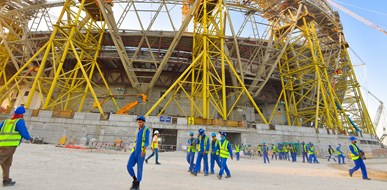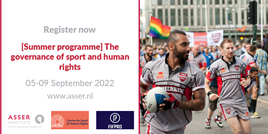[Interview] Daniela Heerdt: ‘The more attention we give to human rights abuses in mega sporting events, the more pressure can be exercised to create a positive change’
Published 4 July 2022By Diva Estanto

@Shutterstock. Doha, Qatar, February 2020. Migrant workers in front of the construction site of the Lusail stadium, the location for the 2022 World Cup.
Daniela Heerdt is a researcher in the field of sports and human rights. Early September, she will kick off the brand-new summer programme ‘The governance of sports and human rights’. Heerdt: ‘Sports law is increasingly connected to human rights. But this doesn't mean that existing institutions are well equipped to address human rights issues related to sports’.
In the past twenty years, major sports tournaments have increasingly been associated with human rights violations. Forced evictions, violent suppression of protests and the exploitation of workers, are just a few examples. In her PhD thesis (2021), Daniela Heerdt zoomed in on the abuses surrounding construction projects in Qatar and the relocations of residents of Vila Autódromo in Rio de Janeiro in the run-up to the 2016 Summer Games. Heerdt: "These two examples are illustrative. Forced labour and forced displacement are the most serious violations around sporting events and occur far too often."
But more goes wrong, she stresses. Privacy violations, for example. During the 2014 Sochi Winter Games, massive street surveillance was carried out using state-of-the-art technology, which the Russian authorities said was necessary to guarantee a safe tournament. Child labour is a risk in an event’s supply chain but also during games and sexual exploitation often increases when there are very many visitors at the same time. "All major sporting events have negative effects on human rights, although the extent depends on the country hosting it."
How did you choose sports and human rights as your research focus?
‘After the FIFA World Cup was awarded to Qatar in 2010, it took only a few years before international media picked up on the terrible treatment of migrant workers that are working on the World Cup’s infrastructure. Many of the workers were being exploited, they had to live and work under terrible conditions, and many of them suffered injuries or even died.
When these reports became public, I was working as a researcher at Tilburg University. I had just finished my master's in public international law and human rights law, and this case really caught my eye. I thought, ‘how is it possible that workers are working under these horrendous conditions? And then I asked myself, ‘how is it possible that these things are going on and no one is held accountable for this?’.
So, with support from professor Nicola Jägers, who was also interested in the topic, I developed a research proposal around legal responsibility for human rights abuses that happen in the context of these mega-sporting events. From there, my research focus became broader than just the Qatar case. It also included forced evictions in the context of other sporting events, such as the Brazil World Cup, the Brazil Olympic and Paralympic Games, and other human rights impacts of for instance the London Olympic Games or FIFA World Cup in South Africa. So, this is what got me into this niche. I was lucky, because at around the same time, the sports world began to change, arguably due to the pressure that came with the Qatar situation. At the same time, sports and human rights in mega-sporting events became a sub-topic within the business and human rights field.’
What is the importance of embedding human rights into sports governance? Do you think that current efforts are sufficient?
‘No, they are not sufficient. If you look at how states are trying to protect and fulfil human rights, you will also find that there is always room for improvement. In terms of sports, there's so much more that can be done. The problem lies in the lack of widespread realisation that sports have an impact on human rights. Some sports bodies are picking up on this notion and fully understand that their daily operations, policies and regulations have an impact on human rights. These sports bodies started to get into the process of implementing human rights and changing their way of working and operating. However, there still is a big group of sports bodies that are denying this link entirely. In my view, this is often related to the conservative claim of sports being neutral and apolitical. Those who hold this view, are reluctant to accept their human rights responsibilities because they fear that once they open the door, there will be a huge range of issues that they will have to react to.’
Do you think that this conservative view poses as a challenge for institutions that are supposed to protect human rights in sports?
‘Definitely. Many sports bodies and related institutions, such as the Court of Arbitration for Sport (CAS), are hiding behind it. They are using this ‘apolitical’ stance as a way to not get into the field of human rights, which will force them to face and react to challenges and issues. But I think it is no longer feasible to simply state ‘we are neutral and apolitical’, since the pressure is increasing rapidly. The best example of this is the sports world's reaction to the Russian-led war in Ukraine: almost all international federations of sports felt the need to make a statement and take concrete actions in response, such as moving events and banning Russian and Belarusian teams or athletes. This has set an interesting precedent. I am convinced it will help the sport and human rights movement to challenge the ‘neutral and apolitical’ stance when sports bodies and federations try to claim neutrality in the future.’
Are existing institutions capable of applying sports law?
‘I think the CAS is very well equipped to apply sports law, which encompasses all the regulations and rules created by federations and sports bodies. However, sports law is only starting to include human rights. That's where the problem lies. If you look at recent host city contracts for the Olympic or Paralympic Games, for instance, or the bidding regulations for the World Cup, you will find provisions that ask the hosts to respect human rights and to provide a remedy mechanism in case there are human rights abuses happening.
In that sense, sports law is increasingly connected to human rights. But this doesn't mean that existing institutions are equipped to address human rights issues related to sports. In the past, we have seen a number of cases with clear and obvious human rights elements being dealt with without any mention of human rights in the proceedings or decisions. So clearly, at the moment, human rights elements in sports cases are too often being side-lined. Still, some cases have been escalated to the European Court of Human Rights. In those cases, it is not more the sport or sports body that is being held accountable but a state and, in that sense, it is a kind of detour. There are, however, other examples where sports bodies were held to account, for instance in proceedings before the Swiss National Contact Point under the OECD Guidelines for Multinational Enterprises. At the same time, there are alternative mechanisms being developed, such as the Sport and Human Rights Dispute Resolution Mechanism developed by World Players and the Permanent Court of Arbitration in The Hague, to ensure that human rights cases can be adequately dealt with. But, we're still at very early stages with them.’
Is there enough international attention for human rights in sports?
‘The international attention for human rights in sports has grown since the World Cup was awarded to Qatar. Media outlets, international human rights organisations, trade unions and even sports teams are starting to focus on the things happening in this field. It is ironic, in a way, that the fact that the World Cup is happening in Qatar actually helps to bring about positive human rights changes in the country and the world of sports more broadly. But obviously, I would say that more attention is needed for other cases. As we saw with Qatar, the bigger the attention for human rights abuses in mega sporting events, the more pressure can be exercised to create a positive change.’
What advice would you give to students who want to enter your research field?
‘I think you should try to approach the topic both in a theoretical and in a practical way. My theoretical take on the issue is constantly tested in my work in practice, which helps me be up-to-date on the latest developments in the field. I can see in practice if my thoughts and theories make sense, or not. In such a quickly developing field, this is really important. So, if you have the chance, then try to not only approach this from a theoretical perspective but make sure to understand what is happening and possible in practice.’
About Daniela Heerdt Dr Daniela Heerdt is a researcher in the field of sport and human rights. She is part of the Asser Institute’s research strand ‘Transnational public interests: constituting public interest beyond and below the state’, which examines how public interests shape, and are shaped, below and beyond the state. Daniela has a background in public international law and human rights law and defended her PhD project entitled “Blurred Lines of Responsibility and Accountability – Human Rights Abuses at Mega-Sporting Events” in April 2021 at Tilburg University. The focus of the project was the question of how to establish legal responsibility for human rights harms that occur in the context of these events, including violations of rights of specific groups like children or migrant workers. Daniela also works as independent consultant in the field of sport and human rights for the Centre for Sport and Human Rights, or the European Parliament among other clients from the sports ecosystem.
Dr Daniela Heerdt is a researcher in the field of sport and human rights. She is part of the Asser Institute’s research strand ‘Transnational public interests: constituting public interest beyond and below the state’, which examines how public interests shape, and are shaped, below and beyond the state. Daniela has a background in public international law and human rights law and defended her PhD project entitled “Blurred Lines of Responsibility and Accountability – Human Rights Abuses at Mega-Sporting Events” in April 2021 at Tilburg University. The focus of the project was the question of how to establish legal responsibility for human rights harms that occur in the context of these events, including violations of rights of specific groups like children or migrant workers. Daniela also works as independent consultant in the field of sport and human rights for the Centre for Sport and Human Rights, or the European Parliament among other clients from the sports ecosystem.
Advance your knowledge on sports and human rights Join us for our unique summer programme on ‘the governance of sport and human rights’ taking place in person at the Asser Institute in The Hague 5-9 September 2022, jointly organised by the Asser Institute, FIFPro, and the Centre for Sport and Human Rights. The programme is a first of its kind. It focuses on the link between the governance of sport and human rights, zooming in on the human rights impacts of mega-sporting events, the rights of child athletes, remedies for sport-related human rights harms, and more. Participants will have the opportunity to learn from experts from the Asser Institute, the Centre for Sport and Human Rights, and FIFPro, as well as high-profile external speakers from both academia and practice. Register now.
Join us for our unique summer programme on ‘the governance of sport and human rights’ taking place in person at the Asser Institute in The Hague 5-9 September 2022, jointly organised by the Asser Institute, FIFPro, and the Centre for Sport and Human Rights. The programme is a first of its kind. It focuses on the link between the governance of sport and human rights, zooming in on the human rights impacts of mega-sporting events, the rights of child athletes, remedies for sport-related human rights harms, and more. Participants will have the opportunity to learn from experts from the Asser Institute, the Centre for Sport and Human Rights, and FIFPro, as well as high-profile external speakers from both academia and practice. Register now.
Read more
Elements for FIFA’s feminist transformation (2022) by Daniela Heerdt and Nadia Bernaz
In this article we explore key elements for a feminist transformation of FIFA’s policies and practices based on the gender framework developed by the UN Working Group on Business and Human Rights in 2019. Overall, we aim to answer the following research question: how can the 2019 UNGP gender framework help FIFA engage in a feminist transformation of their human rights policies and practices in a way that includes FIFA’s confederations and member associations? Read the full article.
